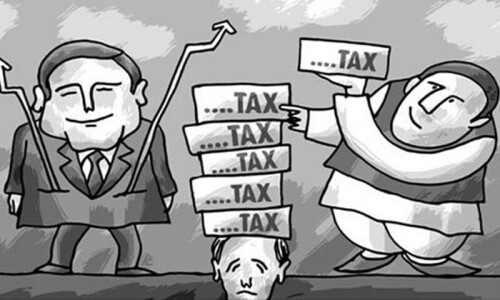
The proposed finance budget for 2024–25 announced recently reflects a recurring theme: the missed opportunity to broaden the tax base and fairly include all economic segments under the tax net. Despite repeated promises, the measures announced by the finance minister fall short.
Inadequate steps have been taken to tap into the undocumented economy, and the focus remains on generating higher tax revenues by increasing rates on existing taxpayers.
The new taxation measures will significantly increase the tax burden on the salaried class, particularly affecting mid-management and technical professionals, adding to the financial strain caused by inflation and reduced take-home pay.
The substantial hike in tax rates for middle-income individuals, coupled with decreasing purchasing power, is likely to make it more difficult to retain talent and may accelerate the brain drain from Pakistan.
The government continually ignores unpaid tax potential across several sectors while choosing to overburden existing taxpayers
According to recent figures from the Bureau of Emigration & Overseas Employment, over the past five years, more than 100,000 highly skilled and qualified individuals have left the country. Compared to 2018, this number doubled in 2022 and is drastically increasing in 2023 and 2024.
Hardworking individuals who dutifully pay their taxes face a disproportionate burden compared to other sectors. Recent reports highlight the stark reality that salaried taxpayers contribute more than their fair share, often shouldering a heavier load than exporters and retailers combined. Compared to the Rs375 billion annual contribution of the salaried class, the estimated 3.6 million retailers across the country pay only Rs4-5bn in taxes per annum.
In the current economic landscape, certain sectors flourish annually, often exploiting legal loopholes or benefiting from privileges granted by powerful interest groups. Sectors such as wholesale and retail trade, real estate, service providers (including doctors, lawyers, and fashion designers), non-corporate businesses, builders, and the transport sector possess significant potential to contribute substantially to our national exchequer.
The agricultural sector, which contributes 20 per cent of the GDP, pays less than 1pc of the total income tax. In contrast, the salaried class already pays 200pc more in taxes than exporters and retailers, yet the government is considering imposing further tax burdens on this class.
Similarly, the real estate sector, with an unpaid potential of Rs500bn, and the wholesale and retail businesses, with an unpaid potential of Rs234bn, are largely untaxed or undertaxed. The four largest contributors to withholding taxes are contractors, bank depositors, importers, and salaried sectors.
In the proposed Finance Bill, the government announced an ambitious revenue target of Rs12.9 trillion and a GDP growth target of 3.6pc. However, the steps announced for bringing retail and wholesale trade into the tax net are insufficient. Once again, agricultural income has been left out of the income tax net.
The federal government often deflects responsibility onto provincial authorities, particularly when it comes to agriculture income, labelling it as a ‘provincial matter’. However, according to constitutional provisions, if agricultural income remains untaxed at the provincial level, the Federal Board of Revenue (FBR) is empowered to levy taxes on it as unexplained income or assets.
What is worse is that the complexities of our tax system are daunting. With businesses paying over 50pc of their profits in taxes and levies while grappling with the complexities of the convoluted withholding tax regime, it’s no wonder that investment enthusiasm wanes.
There are no significant incentives to expand local manufacturing for import substitution and export growth. In fact, some of the proposed new measures appear to encourage higher filing of income tax returns by making business transactions prohibitively expensive for non-filers. But empirical evidence does not support a significant increase in the tax base due to these steps.
While compliant businesses shoulder this heavy fiscal burden, a parallel economy significantly evades contributing its fair share. This stark imbalance begs the question: why should businesses continue to invest? The Overseas Investors Chamber of Commerce and Industry (OICCI), in its ‘Charter of Demands’ mentioned in a letter to the finance minister, highlights this issue. It states that such measures will adversely impact exports and foreign exchange reserves, which are already dwindling.
Pakistan’s investment-to-GDP ratio fell to 13pc in FY24, marking its lowest point since 1972-73. This ratio has been on a downward trend over the years and is currently the lowest among peer economies.
It is thus essential to revisit the unfair imposition of high taxation. Measures such as removing the super tax on corporations, gradually reducing the income tax rate to align with the regional average, and simplifying withholding tax processes are crucial steps to rectify this imbalance.
It is also essential to recognise that foreign investors not only contribute financially but also bring international expertise and technology, and create job opportunities. However, if they encounter hurdles like profit limitations and business complexities, they may contemplate relocating. Tax authorities must prioritise an investor-friendly environment along with a taxation-incentive regime to ensure mutual prosperity.
Moreover, the government possesses a wealth of information through platforms such as the National Database and Registration Authority and the FBR’s Maloomaat Portal, complemented by data from diverse sources like withholding statements and reports from entities such as banks and utility companies.
This rich data reservoir presents an opportunity to expand the tax base using effective data mining without imposing additional burdens on compliant taxpayers.
More importantly, embracing digitalisation is paramount for modernising our economy. The global trend towards a cashless economy underscores the importance of learning from our neighbours; for instance, the demonetisation of Rs5,000 notes could serve as a deterrent to cash transactions.
Additionally, incentivising fintech companies and merchants through tax incentives will not only stimulate innovation but also promote financial inclusion. This, coupled with the establishment of robust protocols for data security and confidentiality to safeguard taxpayer information; we can construct a tax system that is both fair and efficient.
After all, it’s not just about policies and numbers; it’s about fairness and accountability. The government must commit to expanding the tax base and increasing the tax-to-GDP ratio to at least 15pc to 20pc. This requires a comprehensive approach, with firm commitment, capacity-building initiatives, and resource allocation to strengthen tax collection mechanisms. By implementing a more inclusive and fair tax system, the government can enhance business confidence, stimulate investment, and foster sustainable economic growth.
The writer is an analyst and a senior research officer at the Overseas Investors Chamber of Commerce & Industry
Published in Dawn, The Business and Finance Weekly, July 1st, 2024














































Dear visitor, the comments section is undergoing an overhaul and will return soon.